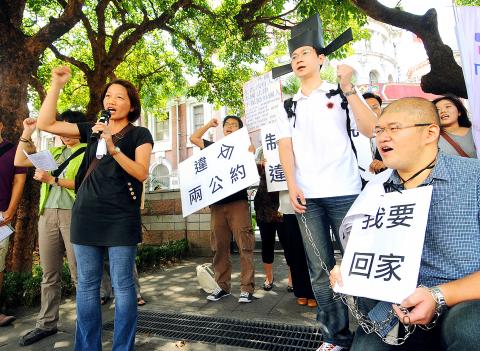Several civic groups yesterday called on the Control Yuan to look into dozens of cases of prolonged pretrial detention of foreigners and to reprimand government agencies for negligence of duty.
Holding various posters, including one that read: “Foreigners in Taiwan are not granted human rights as they are outside the protection of the law,” the groups urged the government watchdog to address the system that discriminates against aliens.
The Taiwan Association for Human Rights (TAHR) said that at the Taipei detention center alone — one of four centers nationwide that hold foreign nationals — dozens of aliens have been detained for more than 120 days even though they have not received sentences exceeding three months.

Photo: Fang Pin-chao, Taipei Times
“Infringement of the liberty of aliens like this is an urgent matter that needs to be resolved,” TAHR secretary-general Tsai Chi-hsun (蔡季勳) said.
The groups said the longstanding problem rested with the National Immigration Agency (NIA), prosecutors’ offices and courts that have procrastinated over holding trials involving detained aliens, as well as the Ministry of Justice and the Judicial Yuan, which have failed to address the human rights violations.
As an example, the groups said authorities detained two Thai migrant workers who were listed as witnesses in a human-trafficking case against employers, for expired visas, for 11 months from September last year.
“The Taiwanese government has been boasting that Taiwan has been given first-class status by the US Department of State in combating human trafficking for two consecutive years. However, is this really how a first-class country treats an alien in detention?” Tsai asked.
In a letter presented to the Control Yuan, the TAHR said that several aliens held at the Taipei detention center for between five and 14 months were detained in connection with crimes in six cases that were all summary offenses, but the Taoyuan District Court had refused to begin their trials.
“The NIA, prosecutors and the court all deserve to be censured,” Tsai said.
Extension of detention is based on Article 38 of the Immigration Act (入出國及移民法), which stipulates that detention shall not exceed 60 days, but if necessary, the NIA could prolong the period until the alien is deported.
“The Ministry of Justice and the Judicial Yuan have turned a deaf ear to our requests to examine the constitutionality of the article,” Tsai said.
The government has taken the lead in infringing human rights by violating the non-discrimination principle enshrined in the International Covenant on Civil and Political Rights that freedom of liberty, movement and a fair trial are rights enjoyed by everyone regardless of nationality, the groups said.
The government must offer compensation for illegal detention to affected aliens in accordance with the Criminal Compensation Act (刑事補償法), they said.

Intelligence agents have recorded 510,000 instances of “controversial information” being spread online by the Chinese Communist Party (CCP) so far this year, the National Security Bureau (NSB) said in a report yesterday, as it warned of artificial intelligence (AI) being employed to generate destabilizing misinformation. The bureau submitted a written report to the Legislative Yuan in preparation for National Security Bureau Director-General Tsai Ming-yen’s (蔡明彥) appearance before the Foreign Affairs and National Defense Committee today. The CCP has been using cognitive warfare to divide Taiwanese society by commenting on controversial issues such as Taiwan Semiconductor Manufacturing Co’s (TSMC, 台積電) investments in the

INVESTIGATION: The case is the latest instance of a DPP figure being implicated in an espionage network accused of allegedly leaking information to Chinese intelligence Democratic Progressive Party (DPP) member Ho Jen-chieh (何仁傑) was detained and held incommunicado yesterday on suspicion of spying for China during his tenure as assistant to then-minister of foreign affairs Joseph Wu (吳釗燮). The Taipei District Prosecutors’ Office said Ho was implicated during its investigation into alleged spying activities by former Presidential Office consultant Wu Shang-yu (吳尚雨). Prosecutors said there is reason to believe Ho breached the National Security Act (國家安全法) by leaking classified Ministry of Foreign Affairs information to Chinese intelligence. Following interrogation, prosecutors petitioned the Taipei District Court to detain Ho, citing concerns over potential collusion or tampering of evidence. The

‘COMPREHENSIVE PLAN’: Lin Chia-lung said that the government was ready to talk about a variety of issues, including investment in and purchases from the US The National Stabilization Fund (NSF) yesterday announced that it would step in to staunch stock market losses for the ninth time in the nation’s history. An NSF board meeting, originally scheduled for Monday next week, was moved to yesterday after stocks plummeted in the wake of US President Donald Trump’s announcement of 32 percent tariffs on Taiwan on Wednesday last week. Board members voted to support the stock market with the NT$500 billion (US$15.15 billion) fund, with injections of funds to begin as soon as today. The NSF in 2000 injected NT$120 billion to stabilize stocks, the most ever. The lowest amount it

NEGOTIATIONS: Taiwan has good relations with Washington and the outlook for the negotiations looks promising, Minister of Economic Affairs J.W. Kuo said Taiwan’s GDP growth this year is expected to decrease by 0.43 to 1.61 percentage points due to the effects of US tariffs, National Development Council (NDC) Minister Paul Liu (劉鏡清) said at a meeting of the legislature’s Economics Committee in Taipei yesterday, citing a preliminary estimate by a private research institution. Taiwan’s economy would be significantly affected by the 32 percent “reciprocal” tariffs slapped by the US, which took effect yesterday, Liu said, adding that GDP growth could fall below 3 percent and potentially even dip below 2 percent to 1.53 percent this year. The council has commissioned another institution